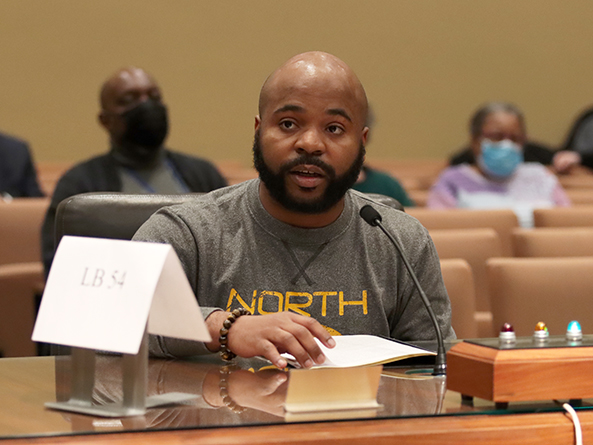Racial, disability impact statements proposed
Certain bills introduced in the Nebraska Legislature would be required to include a statement of their potential impact on communities of color and disability under two proposals considered by the Executive Board Jan. 27.
LB54, sponsored by Omaha Sen. Terrell McKinney, would require any bill related to criminal or juvenile justice to be accompanied by a statement informing lawmakers of the effect the bill would have on communities of color or other marginalized groups.

Statements would be produced by the Legislative Research Office beginning next session and would summarize the estimated impact on racial minority populations in Nebraska and could include any relevant research on the historical racial impact of similar legislation.
The research office could request the cooperation of other state agencies, political subdivisions, accredited academic institutions or other subject matter experts in the preparation of a racial impact study.
McKinney said nine other states currently require racial impact statements, including Colorado and Iowa. Bills often have unforeseen policy ramifications, he said, especially measures dealing with the criminal justice system. This can be seen in the pronounced racial disparities in incarceration rates among minority groups, he said.
“It is paramount that we keep all Nebraskans in mind while implementing legislation that would apply to people of the state, especially some of its most vulnerable who are most susceptible to negative outcomes of legislation that isn’t equitable nor written with the intent of lessening the disparities between people of different races,” McKinney said.
Kimara Snipes, representing the Nebraska Civic Engagement Table, testified in support of LB54. Everyone has biases that need to be challenged with facts and data, she said, and lawmakers in particular need to acknowledge the historic impact of laws on people of color.
“[The bill] really gets to the heart of promoting a legislative process that ensures that no community in Nebraska is left behind,” Snipes said.
Ruby Méndez López of Nebraska Appleseed also spoke in support of the proposal. Structural racism does not rely on individual beliefs or intent, she said, and racial inequalities will continue unless the intentional choice to change them is made.
“Past history is not our fault, but it is our opportunity and responsibility to understand and fix it together to prevent future disparities and harm,” Méndez López said.
LB39, sponsored by Bellevue Sen. Carol Blood, outlines the same requirement for bills related to persons with disabilities.

Blood said lawmakers have long ignored the impact of potential legislation on Nebraskans with disabilities. It’s important for senators to have all the relevant data when debating proposals, she said, and that includes the ways in which bills may disproportionately impact specific communities.
“The goal of the statement is to review any legislation [designated] by the board to ensure that it is equitable and creates no additional burden to Nebraskans with disabilities,” Blood said.
Disability rights advocate Kathy Hoell testified in support of the proposal, saying “hundreds” of bills have been introduced in the Legislature this session with the potential to negatively impact Nebraskans with disabilities, including measures related to voting, housing, education and more.
“Our community is very frustrated with able-bodied people making decisions for us with no consideration of the repercussions we have to deal with,” Hoell said.
Brad Meurrens of Disability Rights Nebraska also spoke in support of LB39. Roughly 11 percent of Nebraskans have a disability, he said, and live in every county in the state. People with disabilities are more likely to live in poverty, be under-employed and lack access to appropriate housing, he said.
“These are our family, our friends, our neighbors and our community,” Meurrens said. “And the state’s major policymaking body must do its best to adequately and accurately evaluate how its choices will impact Nebraskans with disabilities and their families.”
Benjamin Thompson, director of the Legislative Research Office, testified in a neutral capacity on both bills, saying his office is happy to provide any additional research or assistance as directed in order to help lawmakers engage in meaningful debate on proposed legislation.
No one testified in opposition to either proposal and the committee took no immediate action on the bills.


